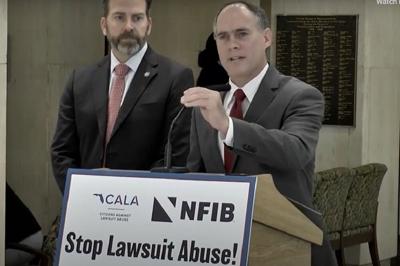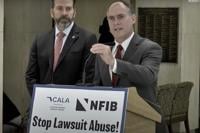
Florida CALA Executive Director Tom Gaitens
TALLAHASSEE — Evaluating the just-concluded 2025 legislative session requires looking at which Florida bills were successfully blocked in addition to those that passed, according to advocates for legal reforms.
The session ended Monday night with the passage of a $115.1 billion state budget bill. But tort-reform groups such as Florida Citizens Against Lawsuit Abuse (CALA) say the most decisive moment for the session may have come when Gov. Ron DeSantis vetoed House Bill 6017, which would have expanded lawsuits to recover noneconomic damages claims in wrongful-death cases.
In turn, the Legislature avoided backsliding on years of reforms aimed at improving the state’s litigation climate and clamping down on excessive lawsuits that have affected the insurance industry and other parts of the Florida economy, the executive director of Florida CALA, Tom Gaitens, told the Florida Record.
“This session began with four groups of companion bills all aimed at turning back the impactful reforms from the 2021, 2022 and 2023 legislative sessions, including special sessions,” Gaitens said. “Fortunately, only one bill moved its way through the process despite a major commitment by the speaker and his legislative leadership team.”
HB 6017 would have expanded damages filings under the state’s Wrongful Death Act by removing current provisions of the law that bar two classes of people from recovering noneconomic damages resulting from medical negligence. The bill would have allowed a decedent’s children age 25 years and older to recover such damages, as well as allowing parents of a deceased child who is 25 years or older to recover such damages..
Gaitens said Floridians are still burdened with a “tort tax” of $5,000 per family due to decades of legal abuse. The new reforms, however, are slowly kicking in and demonstrating results, he added.
“We remain on guard for what will come from the Legislature during next year's session, but as of today, the state has emerged protected, for yet another year, by good governance in regards to civil justice reform,” Gaitens said.
One area where Florida could lead the nation is to bring transparency to the issue of third-party litigation funding (TPLF), which refers to how moneyed interests outside the legal system can manipulate the civil justice system through investments in plaintiffs’ lawsuits, he said.
“Florida can lead by addressing the gaping holes which allow out-of-state and often foreign actors to monetize the funding of frivolous lawsuits, as financial investments,” Gaitens said. “Transparency is key to providing both the court and the jury the information they need for an informed decision.”
The Florida Chamber of Commerce also highlighted the veto of HB 6017 in its review of the legislative session in May.
“The Florida Chamber successfully defeated or worked to mitigate efforts to drive additional litigation, create regulatory uncertainty, or increase costs on Florida businesses and families,” the chamber’s review states. “Specifically, legislation seeking to unwind the progress made with the landmark 2022 and 2023 lawsuit-abuse reforms was defeated, allowing these successful reforms to continue stabilizing insurance markets and lessening tort taxes for Florida families and local businesses.”
The chamber, however, said more work needs to be done, particularly in the area of Florida’s highest-in-the-U.S. medical malpractice rates. In addition, more investments in mega data centers are needed, according to the chamber.
“Free enterprise isn’t free, and the Florida Chamber thanks Gov. Ron DeSantis and many in the Legislature for helping move the Florida Chamber’s competitiveness agenda forward and preventing legislation that would significantly increase litigation from making it across the finish line.”
The chamber also welcomed the passage of HB 1205, which tightens the requirements for citizens’ initiatives to increase transparency, to reduce the chances of petition fraud and to increase penalties for violations. The measure has already been challenged in litigation by voting-rights groups.





